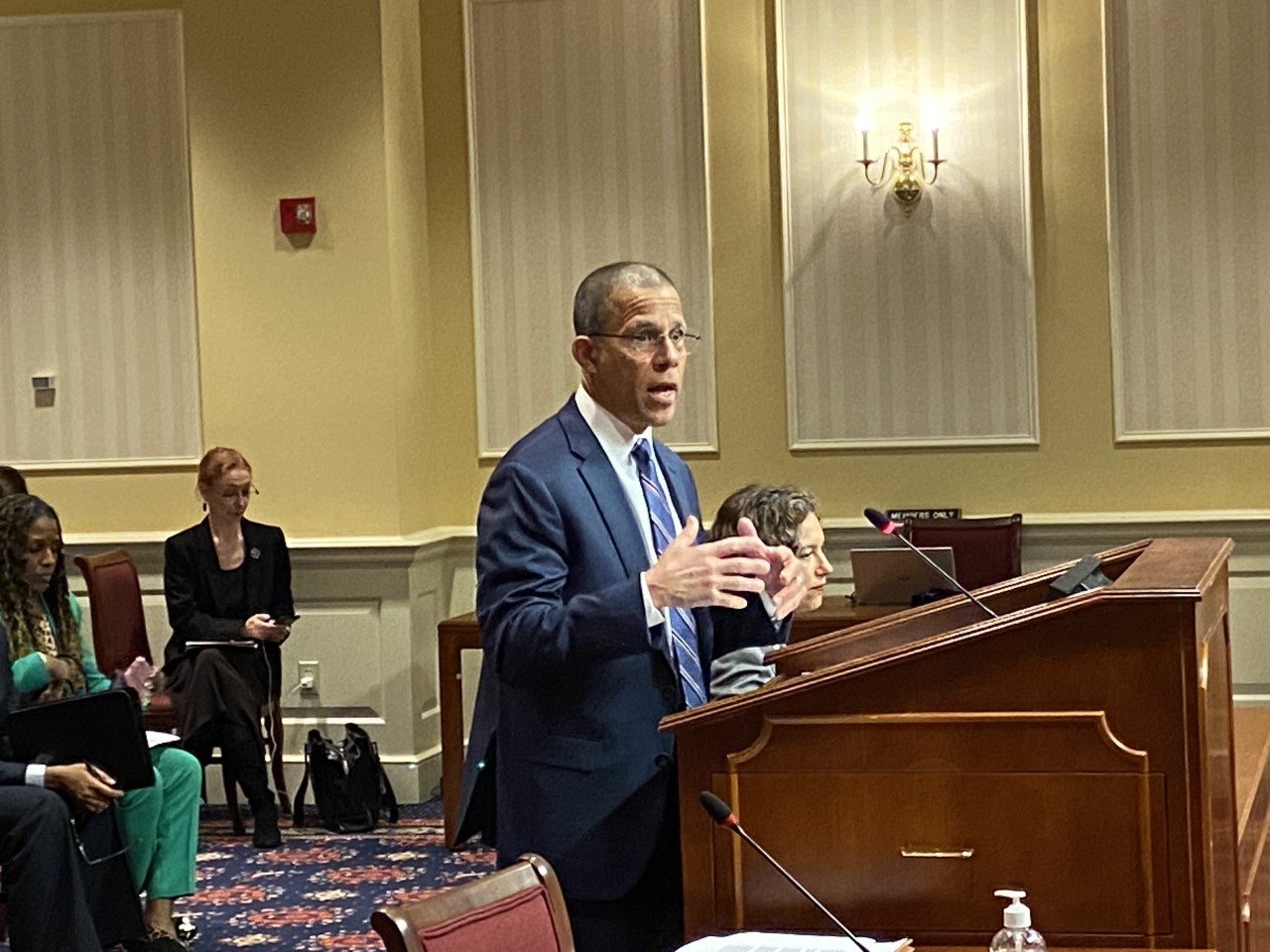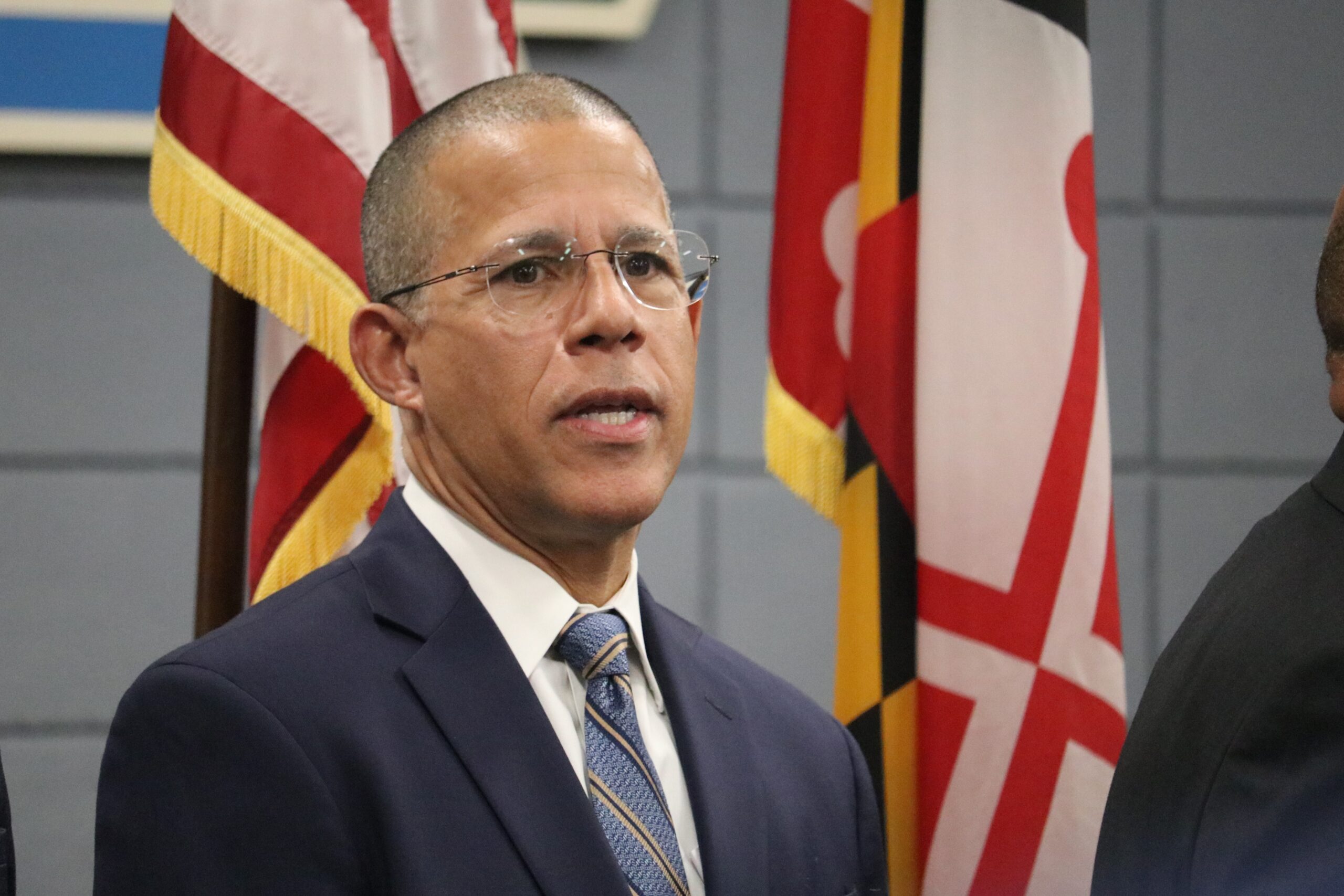Brown pursues a more expansive scope for attorney general’s office with civil rights, pattern-or-practice legislation

As the Maryland General Assembly moves beyond the halfway point of the 90-day legislative session, Attorney General Anthony Brown trained his focus on creating a more expansive scope of work for his office to include enforcing civil rights laws, investigating biased patterns or practices by police and zeroing in on scammers.
In testimony Tuesday before the Senate Judicial Proceedings Committee, Brown (D) advocated for three measures:
Senate Bill 540 would grant the attorney general’s office authority to enforce federal and state civil rights laws and bring class-action lawsuits.
Senate Bill 658 would permit the attorney general’s office to investigate and initiate a civil action to stop alleged racial bias or other discriminatory practices by law enforcement and other agencies. Such pattern-or-practice investigations are used by the U.S. Department of Justice and, Brown said, they are authorized and used by attorneys general in about 10 other states.
Senate Bill 666 would expand the ability of whistleblowers to pursue cases under Maryland’s False Claims Act and False Health Claims Act and establish a civil penalty of at least $5,000 for each violation of the laws. Current law sets a maximum fine of $10,000 per violation but sets no minimum.
Brown said the first two bills are “top priorities” for this year’s session.
He told the committee that Senate Bill 540 specifically would target private entities that have violated civil rights and that at least 21 other states, including Virginia, Delaware and Washington, D.C., allow their attorneys general that statutory authority.
The measure would allow the attorney general to investigate discrimination on matters such as mortgage lending, check-cashing and fraudulent business practices.
The attorney general’s office would work in collaboration with the Maryland Commission on Civil Rights, the independent agency that enforces anti-discrimination laws and oversees discrimination cases in matters of employment, housing, public accommodations and state contracts.
Any fees collected – at least $10,000 on a first violation and $25,000 for a second and subsequent violation – would go into a Civil Rights Enforcement Fund for the attorney general’s office and civil rights commission to investigate and prosecute various violations and conduct education and outreach events.
Glendora Hughes, general counsel for the commission, said it mainly handles individual cases. She said that, if the measure were to become law, the attorney general’s office could investigate cases on a larger scale such as discrimination by a management company that owns multiple properties.
“It’s really about expansion and being able to get more bang for the buck [and] go after more persons than just the individual,” said Hughes, who added the commission and attorney general’s office would coordinate referrals.
Sen. William C. Smith Jr. (D-Montgomery), who chairs the committee, said cooperation between the attorney general’s office and the commission is vital.
“For me it’s important so there’s no…duplication of efforts,” he said to Hughes. “That’s exactly why I appreciate your comments.”
‘What makes you all special?’
Some local prosecutors questioned provisions of the proposed pattern-or-practice legislation on Tuesday, questioning whether the bill would allow the attorney general’s office to file suit against a local state’s attorney.
Steven Kroll, coordinator for the Maryland State’s Attorneys’ Association, and Howard County State’s Attorney Rich Gibson (D) addressed the issue with the committee.
“We are for civil rights, we just believe we should be exempted from this statute,” Kroll said. “[The attorney general] cannot represent both us and prosecute civil rights. U.S. attorneys can do it, they’re best suited to do it.”
Brown said that wasn’t the intention and a suit wouldn’t be filed against “a political subdivision.” In other words, not against a local state’s attorney’s office.
In an advice letter, Brown wrote that certain state statutes and rules explicitly include state’s attorneys within the category of law enforcement but that this part of the law does not.
To eliminate confusion, Kroll and Gibson asked to add text stating that state’s attorneys could not be sued under the measure.
“What makes you all special?” said Sen. Charles Sydnor (D-Baltimore County), asking why prosecutors and judges should be exempted from investigation, especially if a civil rights violation may have occurred.
“Our argument is not that we’re special,” said Gibson, who added any investigation is currently handled by the U.S. Department of Justice or the state prosecutor who handles ethics violations.
“This power has the potential for great harm and similar power has been used to oppress and suppress minority voices,” he said. “We don’t want to create conduits or pathways for that to happen.”
Sen. Chris West (R-Baltimore County) asked whether Kroll would be satisfied if an amendment were added that explicitly says state’s attorneys wouldn’t be sued.
“Absolutely,” he said.
Brown emphasized the bill focuses on police agencies and agencies who care for or oversee individuals under probation and parole or in state correctional, behavioral, juvenile services or immigration detention facilities.
Later, in a voting session on other bills, the committee voted 8-3, along party lines, to recommend approval of Senate Bill 290, which would allow the Attorney General’s Independent Investigations Division to prosecute police-involved deaths or to decide to request a local state’s attorney to do so. Currently, the division only reports its investigative findings to state’s attorneys.
Sen. William Folden (R-Frederick) called this legislation “an overreach” and said it could transform the attorney general’s office into a small version of the U.S. Department of Justice.
“They want to be a mini DOJ and I take exception to that,” said Folden, who is also a Frederick police officer. “It’s just somebody taking a power grab…from the local state’s attorney and that’s a false concept.”
The bill may be discussed this week on the Senate floor.




 Creative Commons Attribution
Creative Commons Attribution